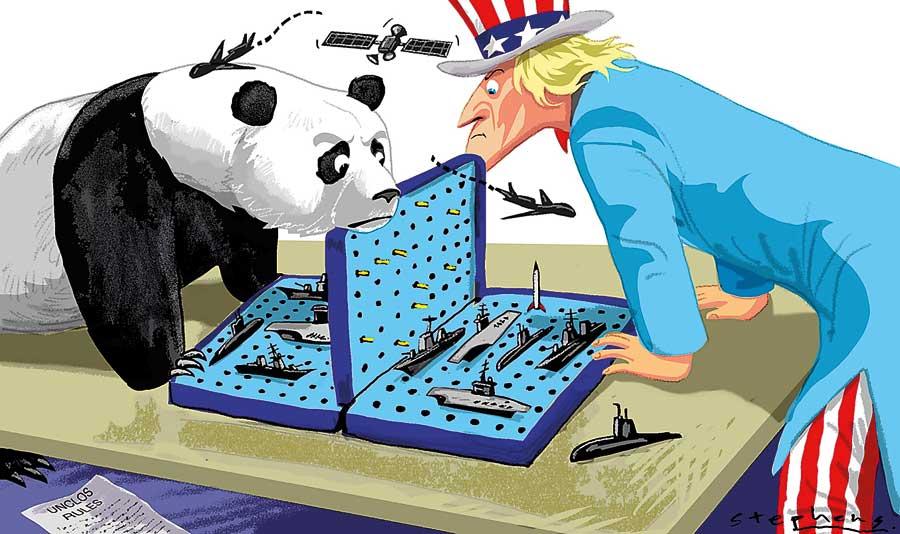Reply To:
Name - Reply Comment
Last Updated : 2024-05-14 10:46:00

Illustration courtesy South China Morning Post
According to both the Bible and the Quran, Jacob’s son Joseph — Yousuf for Muslims — while he was languishing in prison for an offence he did not commit, was brought before the Egyptian king who sought the meaning of the bizarre dream that was troubling him. The king told Joseph he saw in his dream seven fat cows being devoured by seven emaciated cows, and seven green ears of grain being eaten up by seven thin and dried ears.
Egyptian king who sought the meaning of the bizarre dream that was troubling him. The king told Joseph he saw in his dream seven fat cows being devoured by seven emaciated cows, and seven green ears of grain being eaten up by seven thin and dried ears.
In interpreting the dream, Joseph said Egypt would see seven years of bountiful harvest before seven years of hardship. Joseph ended up being the king’s economic affairs minister and ensured that Egypt survived the seven-year famine.
Today, there are no Josephs among us to foresee an economic crisis with divine help. We have to use our own intelligence to predict and prepare for recessions, economic problems, economic warfare, sanctions, and other such measures that threaten to undermine national security, economic security, and food security.
We as a nation lacked the economic intelligence to foretell the current economic crisis which, like an anaconda’s grip, is squeezing the life out of us.
True, learned opposition politicians and independent economic analysts did warn of the crisis as the successive governments went on a borrowing spree and dumped the dollars into unproductive projects reeking of unfathomable corruption. But their warnings were mainly of academic interest or buried in op-ed articles or discussed and discarded in fleeting talk shows.
We have not witnessed economic intelligence-driven public protests against economic policies that could land us in an economic catastrophe. Our trade unions do bark and roar against specific policy issues, like the privatization of state institutions or the entry of foreign players in projects of geopolitical interest. But often their protests have a selfish angle or involve alleged monetary inducements from rival powers.
The bottom line is that Sri Lankans in general lack economic literacy though we are proud of our 92.38 percent literacy rate. In our economic ignorance, we allowed ourselves to be fooled by politicians who took popular decisions only to fatten themselves with ill-gotten wealth and stay in power, instead of thinking like statesmen and taking the right decision, even if it was painful, to put the country and the economy on the right track.
In our world of make-believe, we had champagne living with toddy income. As politicians preyed upon our credulity and whipped up racism during the 2019 election campaign, we found no reason to be alarmed. We failed to understand that such myopic policies would seriously harm the country. We lacked the knowledge to condemn these self-serving policies that made Lanka economically unviable for large-scale foreign investment, one of the main engines of growth in developed and fast-developing Asian countries, all of whom, with the exception of Japan, lagged behind Sri Lanka at independence 75 years ago.
If only we had the economic literacy and the foresight to fathom the falsehood politicians dished out, the country would not have been left in the lurch as an economic orphan, with a begging bowl in the hand outside the doors of the International Monetary Fund.
When in 2019, the Gotabaya Rajapaksa government took economic decisions against the advice of a few independent economists and international funding agencies, we the economic illiterates did nothing, thinking that our president knew best. After all, he was the savior of the nation. That was how he was marketed at the 2019 presidential husting where national security was a decisive issue in view of the Easter Sunday terror attacks that year.
Still recovering from the shock of the terror attacks, we the voters did not understand that economic security was an essential part of national security. The popular president cut taxes, reduced interest rates, again and again, printed money to shore up the state coffers, and artificially pegged the dollar at less than Rs. 200, thus preventing the gradual depreciation, which many now believe would have mitigated the current economic crisis.
Lacking independence and courage to oppose the president’s popular decisions, the Central Bank, the Treasury, and even state-funded think tanks went along with his popular decisions, regardless of the adverse consequences.
True, these state mandarins had no divine support, like Joseph, to foresee the coming Covid pandemic and economy-killing lockdowns. But expecting the unexpected requires economic intelligence. Take this example from Britain.
When Prime Minister Liz Truss assumed office in September after the resignation of Boris Johnson in July, she proposed tax cuts and a big increase in government borrowing to slash energy prices for millions of households and businesses. But her proposals triggered a tsunami of protests even from sectors that would have benefited from the measures. Such was the economic literacy in Britain. No sooner she took these measures than the sterling pound crashed and the market plunged into chaos. She finally resigned, serving only four months in office.
With the Sri Lankan public lacking the economic literacy prevalent in advanced countries such as Britain, the next best move we can think of is the setting up of an economic intelligence unit, like the State Intelligence Service (SIS). Today, most countries view economic intelligence gathering as important as military intelligence gathering. They see economic security through the prism of economic intelligence aimed at assessing risks and opportunities at domestic and global levels.
At a basic level, economic intelligence gathering involves learning from the experiences of other countries. But at an advanced level, it involves research, analyses, and even espionage. Not only states but also private sector entities engage in economic intelligence gathering. The controversy over China’s Huawei Company is a case in point. The company has been accused of espionage through the sale of equipment related to 5G technology.
At the global level, especially before a war begins, a state makes use of its economic intelligence to assess the enemy’s ability to sustain a war. The ongoing conflict between Russia and West-backed Ukraine adequately highlights how the West and Russia use economic intelligence in assessing each other’s ability to cope with sanctions and countermeasures.
But as far as Sri Lanka is concerned, economic intelligence should be more inward-looking. Even the reform-minded present government led by President Ranil Wickremesinghe take decisions that are more reactive than proactive. Often, the government waits till a problem occurs to take mitigating measures as has been seen in multiple crises besetting the agriculture, industrial, health, export, and tourism sectors.
The state of affairs will certainly be better if policy decisions are guided by an independent economic intelligence unit that collects, analyses, works out possible scenarios based on hypotheses, and distributes information to protect and promote national economic security.

Add comment
Comments will be edited (grammar, spelling and slang) and authorized at the discretion of Daily Mirror online. The website also has the right not to publish selected comments.
Reply To:
Name - Reply Comment
US authorities are currently reviewing the manifest of every cargo aboard MV
On March 26, a couple arriving from Thailand was arrested with 88 live animal
According to villagers from Naula-Moragolla out of 105 families 80 can afford
Is the situation in Sri Lanka so grim that locals harbour hope that they coul